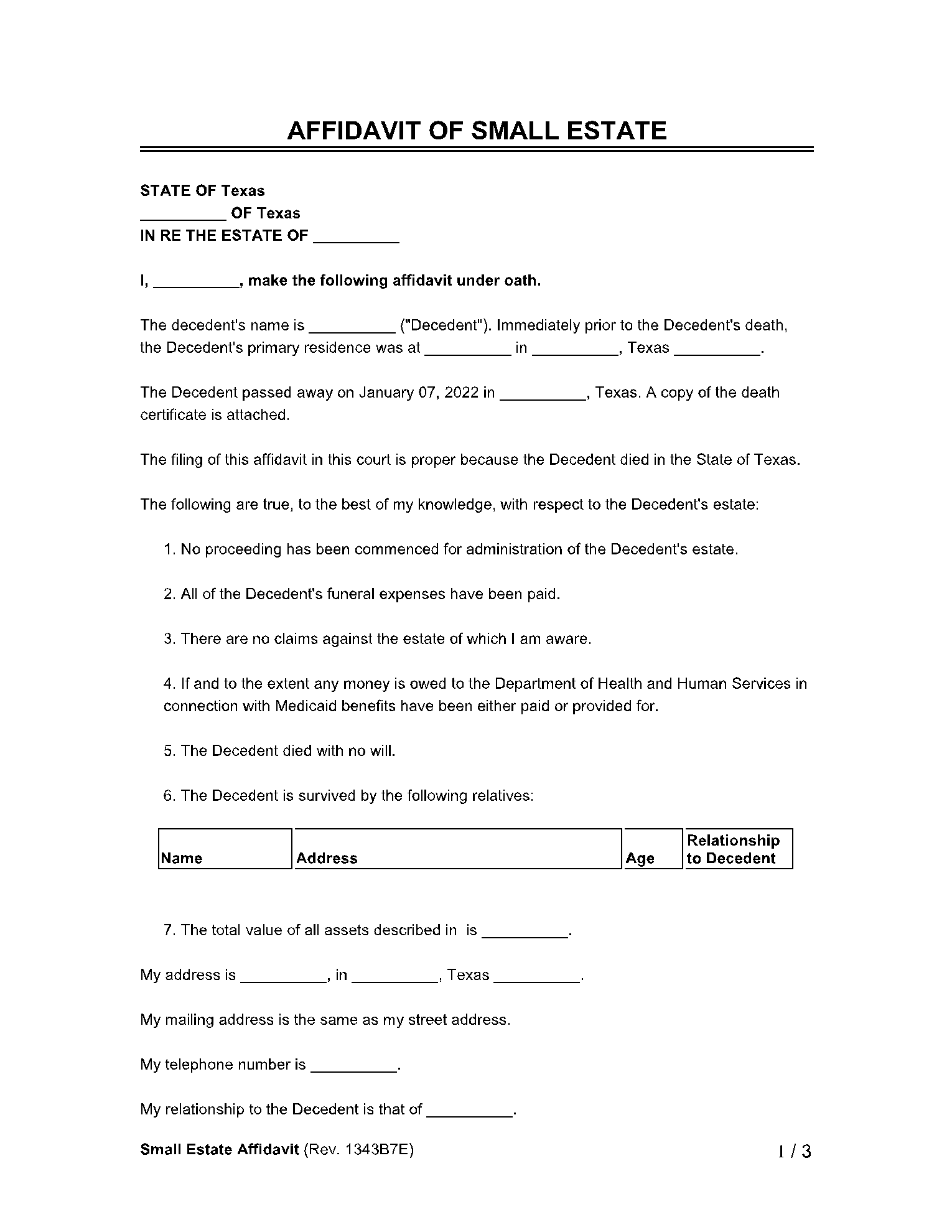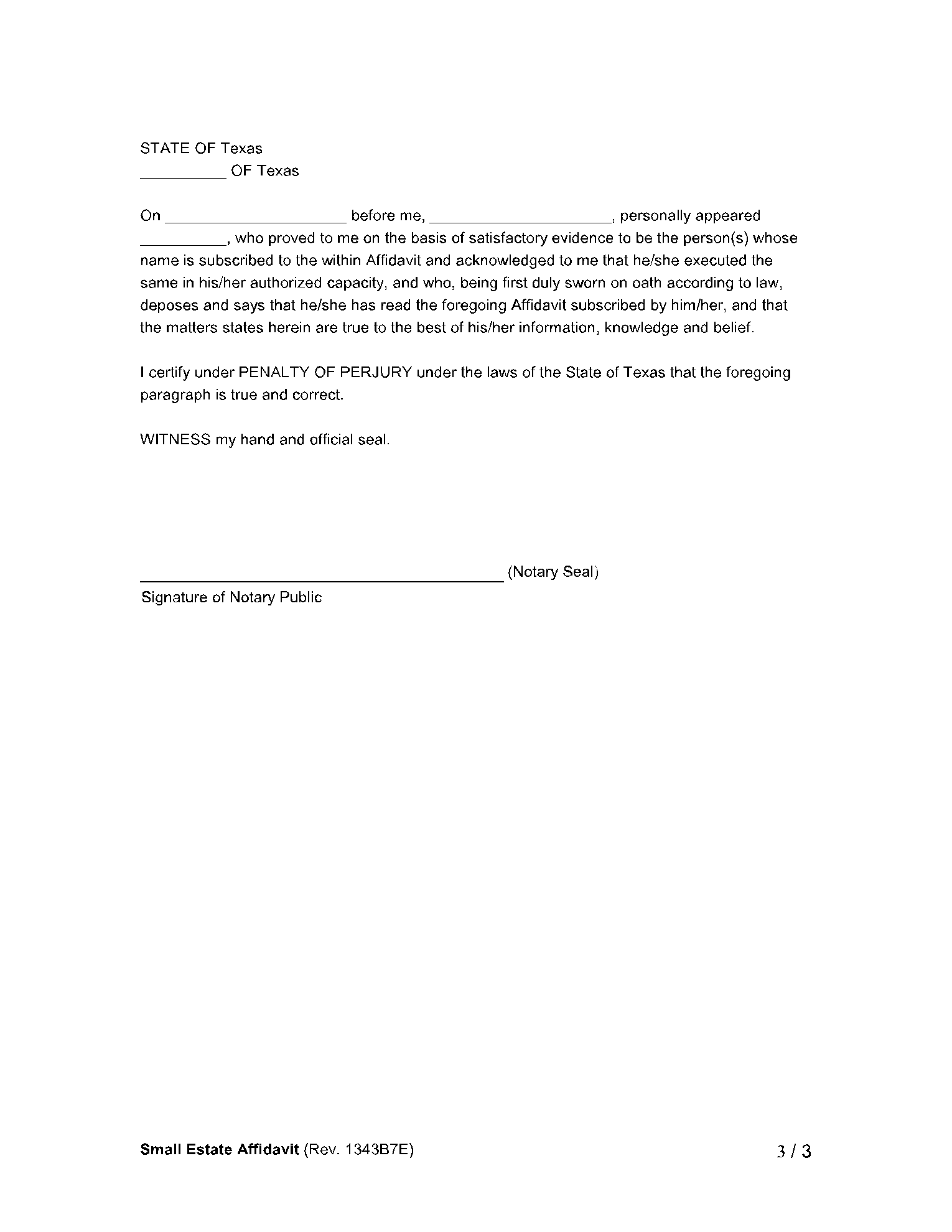Usually, when you wish to acquire a deceased person’s small estate without a probate process, you file a small estate affidavit. However, it works very differently in the state of Texas. Learn all about it in our guide here. If you wish to compose a Texas small estate affidavit directly, jump to our free template above.
What Is a Texas Small Estate Affidavit?
A Texas small estate affidavit is a document that facilitates the transfer of property from a deceased person to a beneficiary. In the state of Texas, small estate affidavits can only be obtained if the deceased leaves no will, and their property is valued at less than $75,000.
The small estate affidavit potentially allows you to avoid lengthy, costly court proceedings related to the distribution of the deceased’s assets. In Texas, you may file the affidavit after a 30-day waiting period after the death of the deceased.
The small estate affidavit for the state of Texas must be approved by the probate court in the deceased person’s county. This is non-optional. Note that acquiring a small estate affidavit in Texas can take some doing – the process is complex.
When Can You NOT Apply for a Small Estate Affidavit in Texas?
You WILL NOT qualify to file a small estate affidavit in Texas if the following holds true:
- The deceased’s (decedent in legal speak) property was more than $75,000.
- The deceased’s debts are greater than their assets.
- The deceased owned real property without the following being true:
- The real property is considered their homestead property and also
- This homestead property will be inherited only by person homesteading with the deceased when they died – namely the spouse and minor children of the decedent.
- You can’t find a hire or if the heirs won’t sign the SEA for any reason (or have someone with legal authority refuse to sign on their behalf)
- A petition to appoint a personal representative of the administration of the deceased’s property is pending or is granted
- An administration is considered necessary in this particular case.
Sometimes the person may have died without a will, but the estate still won’t qualify for a small estate affidavit probate. In this case, you may need to apply for a “determination of heirship”. Consult an attorney for help.
What Information Does the Texas Small Estate Affidavit Contain?
The small estate affidavit must comply with all the laws and guidelines required by the state of Texas, as covered by section 205.001(3).
The information in the affidavit will depend on the county belonging to the deceased. Every county has its own, slightly different requirements. Check with the local probate office in the county before you proceed with composing.
Here is a gist of the information you must provide:
- The name and address of the decedent.
- Their date of death.
- Their assets with a description and market value.
- Their debts with a description and total.
- All the beneficiaries involved, including names and addresses.
- The signatures of all the beneficiaries.
- Applicable forms – such as Civil Case Information Sheet and Order Approving Small Estate Affidavit.
The affidavit must be signed by every distributee or someone authorized to do so on their behalf. Please be aware that you may need to attach a completed Affidavit of Heirship to the small estate affidavit too. If you are attaching an Affidavit of Heirship, a state form, then all this information must be mentioned within:
- The personal details of the third-party, non-biased witness.
- The relationship to the deceased.
- The decedent’s date of death.
- Information about the decedent’s marital history.
- Background information on heirs and how much they stand to inherit, as determined by intestacy laws.
Do I Need Legal Counsel to Prepare the Texas Small Estate Affidavit?
Acquiring a small estate affidavit in Texas is more complex than in other states like Illinois, where you don’t need the probate court’s authorization for the affidavit. There are also several forms that you may need to attach to the affidavit.
Further, you may not know how much money the deceased had exactly. In this case, you may require the local court to order a financial institute to disclose the information.
Hiring an attorney to plan all this out for you is easier than doing it yourself. If you have plenty of time to spare and don’t mind learning new things, though, nothing is stopping you from filing the small affidavit yourself.
Conclusion
If you wish to compose the Texas small estate affidavit, use our free template above. It will guide you through the process of composing an appropriate affidavit. CocoSign offers free small estate affidavit forms for Texas and other states. We also offer free templates for a range of formal requirements and legal scenarios.




